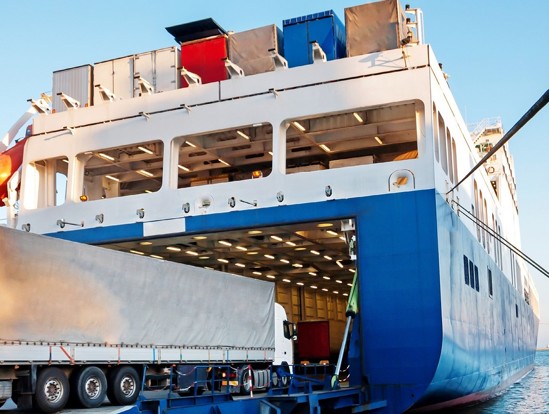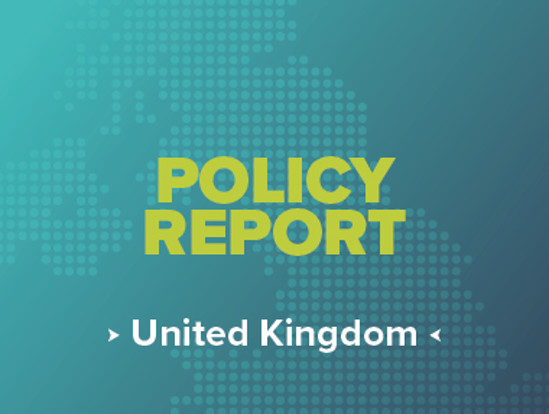Foreword
By making it easier, cheaper and more attractive for SMEs to do business internationally, we have the opportunity to unlock the advantages of trade for small businesses and boost growth across the whole economy

Neil Warwick OBE
FSB Policy Champion,
International and Trade
International trade allows businesses to reach a wide range of customers and markets, boosting sales and growth. Many of the UK’s vibrant small business community have already embraced the opportunities of overseas trade, but we know that SMEs have a lot more to offer the world, from high quality food and drink to world-class manufacturing.
While small firms are extremely agile, innovative and resilient, there are undeniable barriers that make trade more difficult. Throughout my time as FSB’s policy champion for foreign affairs I have seen first-hand how small businesses have grappled with the seismic events that have rocked the global economy in the last few years. The Covid-19 pandemic and the Russian invasion of Ukraine have severely affected the ability of supply to meet demand worldwide while many UK SMEs that trade with the EU are continuing to adapt to new customs processes.
Current and potential exporters report being deterred by burdensome paperwork and high costs. At FSB we are concerned about the long-term consequences of this chilling effect on trade for the growth prospects of both the UK’s small business community and the wider economy.
The majority of the challenges reported by members when gathering evidence for this report are financial or logistical in nature, from high shipping costs to filling out complex paperwork. By making it easier, cheaper and more attractive for SMEs to do business internationally, we have the opportunity to unlock the advantages of trade for small businesses and boost growth across the whole economy. In the North East of England alone, my home region, where export levels are below the national average, there are many more businesses that have the potential to export with the right support to get them started. Just one of these initiatives is the new national pilot for the digitalisation of paperwork for exporting, the ICC Centre for Digital Trade and Innovation (C4DTI) based at Teesside University, and FSB welcomes the launch of C4DTI as a first step to simplifying exporting procedures for our members.
FSB has consistently encouraged, and worked with, the Government to build robust and targeted trade support mechanisms that help the smallest businesses think more strategically about trade from day one. Trade support initiatives alone, however, are not enough. They must be complemented by an effective and user-friendly customs infrastructure that allows goods to move into and out of the UK seamlessly and works well for small firms.
As policymakers rethink the UK’s trade infrastructure, it is essential that administrative processes, global supply chain disruption and the impact of changing trade relationships on the smallest businesses are factored in. FSB hopes that the data and recommendations set out in this report will provide useful insights into the needs of small businesses and help policymakers to shape UK trade processes.
FSB has long valued the opportunity to work closely and collaboratively with Government to support the UK’s smallest traders, particularly HMRC and the Department for Business and Trade. FSB stands ready to work with Government to unlock the trade potential of the UK’s small businesses and I look forward to seeing SMEs flourish in a thriving global trade ecosystem.
Highlights
![<center>[Image text]93%
of small exporters move
goods from the UK to EU
</center>](https://www.fsb.org.uk/static/2cd3a831-cf8e-4526-a75bc687ba3d343b/image_gallery_88a7d5280ad36ac90440e3fe919afdd2/customs-clearance-rpt-7.png)
![<center>[Image text]59%
of small exporters say
the US is their top
non-European market
</center>](https://www.fsb.org.uk/static/5d09f531-3439-40a4-8c93e098ad092701/image_gallery_88a7d5280ad36ac90440e3fe919afdd2/customs-clearance-rpt-8.png)
![<center>[Image text]28% of exported goods are manufactured products such as sporting equipment, furniture, and decorative objects
</center>](https://www.fsb.org.uk/static/46169efe-fd2c-4660-94bd6ca67585f180/image_gallery_88a7d5280ad36ac90440e3fe919afdd2/customs-clearance-rpt-9.png)
![<center>[Image text]81%
of small firms have
experienced cost increases
for overseas goods
</center>](https://www.fsb.org.uk/static/44bc132d-09d0-498d-80de66cc0fe6353d/image_gallery_88a7d5280ad36ac90440e3fe919afdd2/customs-clearance-rpt-1.png)
![<center>[Image text]56%
of businesses that no longer
trade overseas say excessive
paperwork contributed to
their decision to stop
</center>](https://www.fsb.org.uk/static/81977382-b727-4312-a1217619b54e80d4/image_gallery_88a7d5280ad36ac90440e3fe919afdd2/customs-clearance-rpt-2.png)
![<center>[Image text]61%
of small international traders
face high shipping costs
</center>](https://www.fsb.org.uk/static/5c711140-dbe8-48b0-872a7c39c89632d5/image_gallery_88a7d5280ad36ac90440e3fe919afdd2/customs-clearance-rpt-3.png)
![<center>[Image text]Just 9% of small firms have a dedicated
staff member or team to
handle trade and customs
</center>](https://www.fsb.org.uk/static/7a04b915-160c-45e7-a9a6f306a8b0cad5/image_gallery_88a7d5280ad36ac90440e3fe919afdd2/customs-clearance-rpt-4.png)
![<center>[Image text]51%
of small firms say Government’s
top priority should be to lower
the overall costs of trade
</center>](https://www.fsb.org.uk/static/e96e98c9-84d8-4863-aea2db365e31a08d/image_gallery_88a7d5280ad36ac90440e3fe919afdd2/customs-clearance-rpt-5.png)
![<center>[Image text]39%
of small firms want more
user-friendly customs
declarations to be a priority
for Government
</center>](https://www.fsb.org.uk/static/e9b704c2-0e1b-4142-8baaf7f7ac562589/image_gallery_88a7d5280ad36ac90440e3fe919afdd2/customs-clearance-rpt-6.png)
Key findings
SME trade is often low volume/low value but relatively high frequency:
- 45 per cent of importers and exporters say the average value of the items they trade is below £2,000.
- 93 per cent of businesses that send goods valued below the £135 customs threshold have fewer than 10 employees.
- 39 per cent of traders that move goods do so at least once a week, of whom 27 per cent move goods more than once a week.
Small firms are struggling with the costs of trade:
- 9 per cent of respondents said they used to import or export but have stopped within the past five years.
- The top reasons for stopping are the volume of paperwork (56%), overall costs (49%) and supply chain or logistical issues (29%).
- The top challenges facing current traders are high shipping costs (61%), losses and delays in transit (54%) and lack of clear guidance (45%).
SMEs have limited resources to deal with trade in-house:
- 9 per cent of firms have a dedicated employee or team to handle customs.
- 38 per cent of SMEs with over 50 employees have dedicated staff/ teams for trade compared to 5 per cent of businesses with fewer than 10 employees.
- 71 per cent of SME traders use an intermediary for at least some of the process of handling customs declarations.
- 61 per cent of businesses use a large fast parcel operator.
Top trading partners:
- The top 5 markets for small business exports are Ireland, Germany, France, United States of America (USA) and the Netherlands.
- The top 5 origin markets are Germany, USA, China, France and Italy.
- Europe is still the top export and import market by global region: 93 per cent of FSB exporters and 87 per cent of importers move goods between the UK and other European countries.
- The USA is the top non-European market for SME trade (59% of exporters and 32% of importers).
SMEs are adjusting to the new UK-EU relationship:
- According to FSB’s quarterly Small Business Index, 13 per cent of SME EU traders say they have stopped trading temporarily or permanently with the EU since the UK’s exit (Q4 2022).
- 5 per cent of EU exporters have or are looking to warehouse goods in the EU.
- Relatively few businesses have pivoted to new markets since the end of the transition period: 6 per cent of EU exporters and 5 per cent of EU importers.
Supply chain disruption is driving costs and reducing availability:
- Most small businesses have experienced cost increases (81%) and lower availability (60%) of goods that originate from outside the UK.
- Many have been forced to absorb costs (40%) or increase prices (56%).
Tackling the costs of trade is critical:
- When asked for their top three priorities for the Government, the top answers chosen by SMEs are to: lower the overall costs of trade (51%), make customs declarations more user-friendly (39%), and deliver clear guidance (36%).
Recommendations
Improving trade infrastructure
The UK Government should deliver an effective and small-business friendly Single Trade Window (STW) - an online portal that will bring in a ‘once and done’ approach to Government collection of the data traders need to provide to export or import. To achieve this:
- HMRC should carry out and publish a comparative analysis of countries that have already implemented a single window for customs and report on best practices.
- HMRC should deliver the STW within a realistic timeframe that allows for robust testing. The Financial Secretary to the Treasury should review progress on the STW and delay roll-out if the current timeline does not allow for a robust pilot. In parallel, the Trade Select Committee/Public Accounts Committee should undertake a short inquiry to assess progress on STW delivery.
- The Home Office should deliver consistent, high-quality customs training to Border Force staff. Customs training must not be deprioritised in favour of immigration processes. Government should encourage close cooperation between customs authorities in the UK and its trading partners.
Knowledge and guidance
- The Department for Business and Trade should further develop and promote the Export Support Service (ESS). We propose the creation of an ESS Advisory Group to promote awareness and shape future resources.
- The Department for Business and Trade should target resources towards small businesses with high export potential. More detailed resources should be developed for businesses in sectors that say they find a lack of guidance particularly difficult.
- HMRC should develop new funding streams for small businesses to invest in private sector support. Building on the SME Brexit Support Fund, Government should deliver vouchers which allow businesses to fund a wide range of trade-related activities.
Trade digitisation
- The UK Government should commit to passing and implementing the Electronic Trade Documents Bill. The Department for Business and Trade should raise awareness of and promote the advantages of digital trade documents via its new Help to Grow site.
- The UK Government should champion digital trade through its diplomatic efforts around the world. The UK Government should drive forward its support for digital trade via multilateral initiatives such as the WTO Joint Statement Initiative on e-Commerce, and its bilateral Free Trade Agreements.
Making trade easier, cheaper and more attractive
- The Competition and Markets Authority should provide a ‘year on’ update from the Five Eyes working group on supply chain disruption and going forward should provide annual update reports.
- The UK Government should continue to implement and promote trade facilitation measures. The Government must complement delivery of the Single Trade Window with awareness raising initiatives, such as a dedicated roadshow or resources on the new Help to Grow site.
- The UK Government should adopt a ‘think small first’ approach to customs policy development. Policymakers must place small businesses at the heart of new trade and customs structures to avoid disproportionate cost or administrative burdens. This should include commitments to robust piloting and phased implementation timelines. Government should also commit to raising the de minimis customs duty threshold to £1,000.
Download the full report




